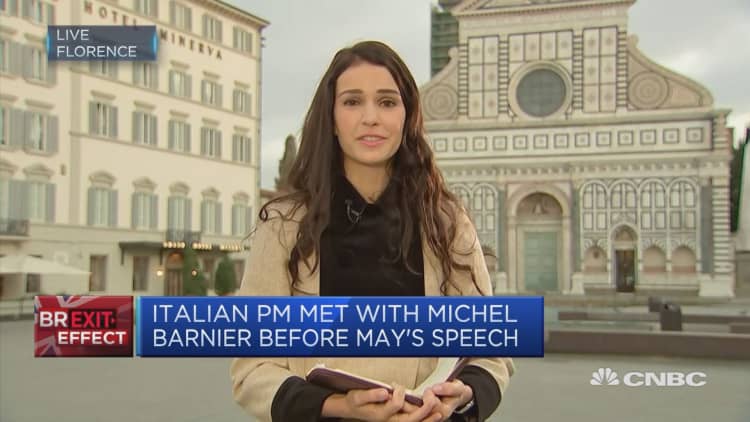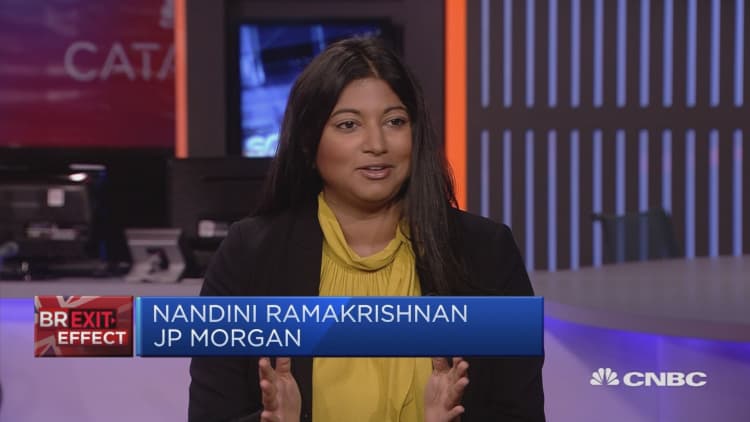
British Prime Minister Theresa May is poised to travel to Florence, Italy on Friday with ambitions to underline Britain's hopes for a "special partnership" with the European Union (EU) post-Brexit.
In a move likely to be viewed as an attempt to break the current deadlock, May is expected to give an "update on Brexit negotiations so far", the prime minister's deputy spokesperson said last Thursday.
Why will May make a speech?
May's much-anticipated speech in Florence marks the government's third major policy statement on Brexit, following the prime minister's Lancaster House speech in January and her letter triggering Article 50 in March.
"It is also a tacit admission that her government needs to improve the atmosphere around the Article 50 negotiations," Mujtaba Rahman, Europe director of political risk consultancy Eurasia Group, said in a research note.
EU officials – including the bloc's chief negotiator Michel Barnier – have criticized Westminster in recent weeks, claiming that progress on a divorce deal has been much too slow.
The fourth round of Brexit talks are scheduled to begin on Monday after they were pushed back by a week. Downing Street has denied the delay in talks was caused by May's speech in Florence three days beforehand.
What will she talk about?
Carsten Nickel, deputy director of research at Teneo Intelligence, argued that May's position in government remained "too weak" to allow her to make any major announcements on Friday.
Opposition to Brexit within the U.K. has been emboldened since May failed to win a clear mandate in June's snap general election. She ultimately lost her parliamentary majority but held on to power thanks to an agreement with a small Northern Irish party.
"May might formally back the deal achieved over the summer between Chancellor Philip Hammond and Trade Secretary Liam Fox over the need for a transition period of around two to three years," Nickel said.
"She might indicate her willingness to accept off-the-shelve rather than tailor-made institutional solutions for continued single market and customs union membership during that period; and she could signal the U.K.'s willingness to keep paying into the EU's budget during such a transition," he added.
According to the BBC's political editor Laura Kuenssberg, May will say Britain is willing to pay 20 billion euros ($24 billion) to the EU during the transition period but only if the U.K. has access to the singles market and some form of customs union.
Until now, May has frequently said she is hoping to secure a deal that is good for both the U.K. and the EU – but, significantly, has not ruled out leaving the bloc without one.
Downing Street has offered no further details as to the contents of Friday's speech other than to say "she will underline the government's wish for a deep and special partnership with the European Union once the U.K. leaves the EU."
What about Boris Johnson?
U.K. Foreign Secretary Boris Johnson sparked political chaos on Tuesday, as reports surfaced that he could resign from his position in government shortly after May's eagerly anticipated speech in Florence.
While Johnson is an outspoken supporter of the U.K.'s departure from the EU, he has faced accusations of trying to undermine the prime minister with a 4,000-word article detailing his post-Brexit vision.
On Tuesday, Britain's foreign secretary reportedly said he would have no option but to quit if May promoted continued payments to the EU in exchange for access to the single market on Friday. But Johnson later dismissed this claim.
"I am mystified by all this stuff," Johnson told the Guardian in an interview on Tuesday. "Not me, guv. I don't know where it's coming from, honestly."
On Tuesday evening – after Johnson had dismissed reports indicating he could resign – it was reported May would offer 20 billion euros ($24 billion) to fill a post-Brexit hole in the EU's budget, according to the Financial Times citing sources which could not be verified by CNBC.
Johnson's Telegraph article, published last Friday, argued Britain should not have to pay for access to the EU's single market – a tariff-free trading bloc for goods and services.

"(May's) speech actually illustrates a larger (and) more important point in that the priorities of the European negotiators are very much the financial contribution to the EU pot. Whereas, the U.K.'s priorities are protecting the trade agreements and the trade relationships that the U.K. can take advantage of," Nandini Ramakrishnan, global market strategist at JP Morgan, told CNBC on Wednesday.
How will the EU respond?
Michel Barnier is not expected to respond to May's major speech on Friday, as Brussels has frequently said it will not negotiate with Britain on the basis of such speeches.
"Rather, Brussels will be assessing—and will wait to see—whether the speech lays the groundwork for the U.K. government to make more substantive progress in the Article 50 negotiations that will take place the following week," Eurasia's Rahman said.
"EU leaders hoping for a significant change of policy (rather than tone) are likely to be disappointed," he added.


